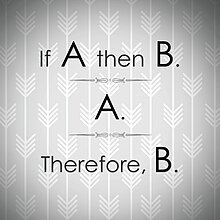
Back Forma lògica Catalan Forma lógica Spanish صورت منطقی Persian Логикалық формалар Kazakh منطقي بڼه Pashto/Pushto Forma lógica Portuguese Логическая форма Russian

In logic, the logical form of a statement is a precisely-specified semantic version of that statement in a formal systemic . Informally, the logical form attempts to formalize a possibly ambiguous statement into a statement with a precise, unambiguous logical interpretation with respect to a formal system. In an ideal formal language, the meaning of a logical form can be determined unambiguously from syntax alone. Logical forms are semantic, not syntactic constructs; therefore, there may be more than one string that represents the same logical form in a given language.[1]
The logical form of an argument is called the argument form of the argument.
- ^ The Cambridge Dictionary of Philosophy, CUP 1999, pp. 511–512
© MMXXIII Rich X Search. We shall prevail. All rights reserved. Rich X Search